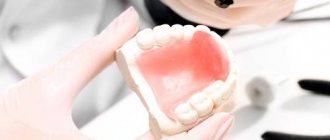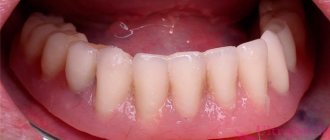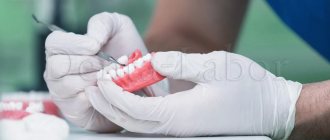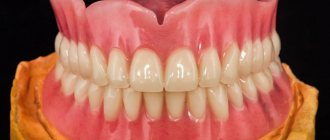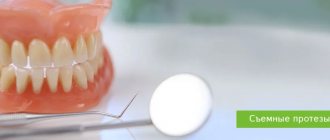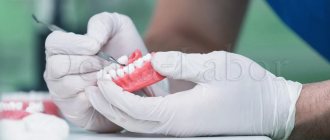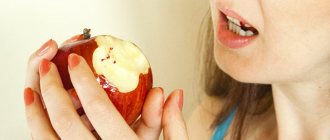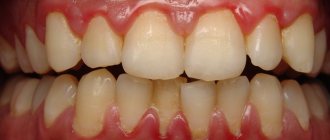Reasons What to do?
When do you need to see a doctor urgently? Methods of treating gums Solutions Advantages of prosthetics on implants Prevention Doctors Work Removable dentures solve many problems: functional (chewing, diction), aesthetic (smile), psychological (no fear of communication). But it also has disadvantages. Unpleasant sensations caused by the gums being rubbed by the denture.
You should not immediately blame the orthopedist; over time, the relief of the oral cavity changes. Due to the absence of teeth, bone tissue atrophy increases, the gums sag, fixation is disrupted, and as a result, correction or a new product is required.
Reasons why removable dentures rub
Even a well-made removable denture takes some getting used to. A foreign object in the mouth causes psychological problems and can also scratch and irritate the gums. Therefore, correction requires several visits, and adaptation – several weeks. But sometimes correction doesn't help.
Removable dentures rub when:
- The manufacturing technology was violated
: the technician did not polish well enough or did not notice the growth, which irritates the mucous membrane and causes discomfort. - The design is poorly fitted
. - The patient has untreated gum disease
: periodontitis can cause the gums under the dentures to become inflamed; it not only provokes inflammation, but also changes the contour of the gums when they swell.
- Gum recession:
due to bone tissue atrophy, trauma, unsuccessful treatment, the gums “sag” and the structure is no longer suitable.
- Service life:
over time, the base becomes covered with microcracks and roughness, which have an irritating effect.
Preventive measures
To prevent a negative reaction after the installation of dentures, you should follow the strict instructions and recommendations of the dentist. It is necessary to maintain oral hygiene to reduce the risk of inflammation.
To do this, the specialist recommends adhering to the following prevention methods:
- Removable structures must be removed at night. Thus, the gums “rest.” This clause does not apply during the first week of installation.
- You should periodically massage your gums. Using your finger will speed up blood flow and relieve tension from soft tissues.
- When brushing your teeth daily to remove plaque, you need to pay attention to the interdental space and tongue. It is necessary to clean out food debris in the cracks, otherwise an inflammatory process will develop over time. A brush with fine soft bristles and a irrigator should be used to prevent stones. Cleaning time is at least 2 minutes.
- When eating food, you need to distribute the load evenly on both sides of the jaw.
- Rinse after every meal. Herbal infusions and purified water can be used.
- Avoid foods such as chewing gum, nuts, crackers, gummy candies, and hard fruits.
- If indicated, complete absence of dentition, bone tissue atrophy or anatomical features of the jaw, use fixing gels, creams, powders.
Following these dental care rules will allow your gums to quickly adapt to the structure. If cracks, breaks, or loose fit of the plates to the gums appear, you should contact a professional.
What to do if your denture rubs your gums
Discomfort, burning, and pain should not be tolerated; you should immediately contact an orthopedist. Inflammation of the gums under the prosthesis causes improper fitting, unreliable fastening, periodontal disease, as well as:
- Poor hygiene.
Whether it is a complete denture or a partial one, care for the oral cavity and the product itself must be thorough so that pathogenic microflora does not provoke disease. - Refusal to sanitation
of the oral cavity and dental treatment before prosthetics. Plaque and carious cavities are breeding grounds for microbes, so professional cleaning and treatment are prerequisites for a positive result. - Allergic reactions
. If acrylic is used in the design, then the symptoms may be a manifestation of an allergy to the monomers that are part of it.
First you need to eliminate the cause, and only then adjust the prosthesis; only an orthopedic doctor can do this professionally.
Symptoms
It is not difficult to determine the presence of a pathological process, since the inflammatory process has pronounced symptoms. The patient is concerned about the following signs:
|
Important! If the above symptoms appear, you should immediately visit a doctor. Otherwise, more dangerous complications may occur.
Symptoms that require immediate medical attention
Patients often think that if their gums hurt under dentures, then this is normal, so they delay going to the doctor. Swelling and redness appear on the gums. If nothing is done at this stage, erosions and ulcers appear on the mucous membrane. Traumatic (prosthetic) stomatitis develops; drug treatment is needed.
Constant mechanical irritation leads to the formation of papillomas, which can degenerate into tumors.
Burning, discomfort, and unpleasant sensations are sometimes caused by common diseases: diabetes, alcoholism, immunodeficiency states. If you have teeth, in such cases it is better to install clasp dentures, and if this is not possible, then plate products with a soft layer under the base. The soft layer is also used if the palate is rubbed with a prosthesis.
Recommendation #2. Give the prosthesis for relining and correction
People planning to install removable dentures should understand that the structures periodically need correction and relocation to suit the characteristics of the jaw bone tissue and mucous membrane, which gradually atrophy, that is, decrease in volume.
If the device has just been manufactured and fixed, then in the first months about ten corrections may be required. Moreover, the fewer teeth you had at the time of prosthetics, the more visits you will have to make to the clinic. You need to understand that the bite has been broken for a long time, so even the most well-designed prosthesis can cause discomfort at first.
Relining the prosthesis can help reduce discomfort.
After getting used to and normalizing the bite relationship, we also shouldn’t forget about corrections. They need to be done approximately once every 6-12 months. Otherwise, the structures will begin to shift, rub, and fall out of the mouth.
Does the prosthesis press and rub? Make an appointment with a doctor, but before visiting the dentist, try to walk with a removable device for at least 3-4 hours, so that the orthopedist can use the mark left on the soft tissues to assess which area should be given special attention and what adjustments need to be made according to the situation.
Gum treatment methods
Manipulations depend on the reason:
- in case of allergic reactions, the base is changed to hypoallergenic (nylon, AcryFree), antihistamines are prescribed;
- for papillomas, excision surgery is performed;
- when a removable denture rubs, a correction (relining) is made;
- if the crown falls off, it is soldered back.
To soothe gum inflammation, ointments, infusions and lotions are used.
Pharmacy products:
Kamistad, Metrogyl Denta, Solcoseryl, Cholestal, Asepta. These gels and pastes have analgesic and anti-inflammatory effects. Before applying them to your gums, read the instructions carefully.
Disinfectant solutions:
chlorhexidine, furatsilin, destroy pathogenic flora.
Home remedies:
applications of sea buckthorn and rosehip oil. Rinse in the form of infusions of sage and plantain. Solutions of soda and salt also soothe irritation in the mouth.
How to get rid of pain
It is important not to take independent action. Treatment of gum inflammation from dentures is carried out by a dentist, who first of all conducts an examination, identifies the cause of the pathology, and only then prescribes therapy and answers the question “how to treat.”
To cure the inflammatory process and eliminate pain caused by improper installation of the structure, correction of the prosthesis is undertaken. If the cause of the pathology is an allergic reaction to metal and its alloys, then there is only one way out - the manufacture and installation of a metal-free structure made of zirconium dioxide.
In a clinical setting, specialists treat and irrigate gums for regeneration and remove necrotizing tissue.
At home, patients use:
- Medications. The use of antibiotics and painkillers is prescribed by the dentist only if the gums under the dentures hurt as a result of complications.
- The most popular use of rinses, creams, gels and ointments, balms with anti-inflammatory, antimicrobial and antiseptic effects. The following popular brands accelerate the healing of gums - “Metragil-Denta”, “Miramistin”, “Cholisal”, “Forest Balsam”, “Malavit”, “Chlorhexidine”. Regular use and surface treatment helps relieve unpleasant symptoms and destroy bacteria accumulating under the structure.
- The use of special toothpastes (“Lakolyut”, “President”, “Parodontax”) helps reduce bleeding gums and relieve inflammation. The medicinal paste is used for a month. It is impossible to treat the gums after this time. You can add a drop of tea tree oil to a pea-sized amount of product. This is a natural antiseptic that is actively used in dentistry.
The application of collagen plates and pads under removable dentures is recommended by the doctor in case of constant friction. They perform the function of protecting the mucous membrane and disinfecting the surface. The plates are applied three times a day to the mucous membrane.
Advantages of prosthetics on implants
- Bone tissue does not decrease, the facial contour is preserved, the smile looks younger;
- the supporting teeth do not deteriorate;
- any number of teeth are restored;
- immediately after implantation, a temporary prosthesis or a permanent ceramic-composite structure is put on (using the Resmile method);
- there is no problem with suction (as in removable ones), the structures are fixed with screws or dental cement.
Work of ROOTT dentists on implant prosthetics for periodontal disease
Recommendation #1. Use products from the pharmacy
If you are not ready to see a doctor right away or cannot do this for objective reasons, then try to solve the problem with the help of various medications:
- medicinal and anti-inflammatory gels (“Cholisal”, “Solcoseryl”): the products help relieve the inflammatory process, relieve pain, promote rapid regeneration of damaged tissues, disinfect and prevent pathogenic bacteria from entering the mucous membrane,
Ointment can be used to relieve symptoms - self-absorbable collagen plates for gums (for example, “Farmadont”): contain sage, rose hips, chamomile. They have antiseptic, cooling, regenerating, soothing properties. They can be used in the complex treatment of stomatitis, gingivitis and periodontitis,
- pads (“Protefix”) and fixing creams (“Korega”, “President”): improve the quality of fixation of the prosthesis in the oral cavity, due to which it stops moving and rubbing. They create an airtight layer, so pieces of food do not get clogged between the structure and the gum, which again contribute to irritation of delicate tissues,
For better fixation of the prosthesis, you can use special fixing creams. - rosehip and sea buckthorn oils: have a calming and regenerating effect,
- rinsing with drugs such as Miramistin, Chlorhexidine, chamomile and sage: have an antiseptic effect, prevent the development of the infectious process, help reduce sensitivity, activate local immunity, and start the process of tissue regeneration.
“I rubbed my gums with a prosthesis and didn’t know how to treat it. I went online and honestly, gentlemen, I was horrified. Some craftsmen seriously suggest using a file or sandpaper to adjust or grind down artificial material. I'm shocked! This is some kind of last century, so you can completely damage the prosthesis, and even seriously injure your gums with this homemade sawed product!!!”
Natali, fragment of a review from the dental portal gidpozubam.ru
The listed means are good for protecting the mucous membrane both during the process of adaptation to a removable structure, and after habituation. They will help relieve unpleasant symptoms until you see an orthopedist and receive qualified help. They can also be used after consulting a doctor.
Pharmacy medications will bring significant relief if the prosthesis was really well made and does not yet need correction. Otherwise, medicinal ointments and pads will have a temporary and very short-lived effect.
Recommendation #3. Exchange your old denture for a new one
If, after examination by a doctor, it turns out that the product cannot be adjusted or repaired, it will have to be replaced to avoid discomfort and chafing. But remember that when the doctor installs a new structure, during the period of getting used to it, it is important to pay attention to the slightest inconvenience and report them to the orthopedist so that he can make timely adjustments and adjust the new teeth to your individual characteristics.
We list the cases in which it may be necessary to manufacture a new device:
- an allergic reaction to the materials of the old prosthesis occurred,
- the structure has become deformed, broken, or irretrievably lost its visual appeal due to poor-quality hygienic care or its complete absence,
- the clinical situation in the oral cavity has changed: for example, the patient wore a partially removable device, but his teeth, which acted as supporting teeth, collapsed or fell out,
- The service life of the system and the materials used to create it have expired: the service life of removable devices is very short. The best of them, for example, Acry-Free, clasps and Quattro Ti can last up to 5-7 years, and nylon and acrylic ones must be replaced after 2-5 years.
If the structure breaks down, you should replace it with a new one.
It is very important that at the stage of preparation for prosthetics, the specialists of the clinic where you contacted carry out a comprehensive comprehensive diagnosis of the condition of the maxillofacial apparatus. Doctors of the most innovative dentistry today use mainly digital equipment and software in their work, which allows them to identify all functional disorders of the umbilical nervous system and create a truly comfortable prosthesis that will help correct all defects.
How to prevent denture chafing
No one can give a 100% guarantee that addiction will go smoothly. The grinding-in process is too individual. But there are a few tips that will help you avoid unpleasant moments. It's better to use them. For example:
- take oral hygiene and denture cleaning seriously - plaque accumulation and food debris can complicate the situation. For disinfection you need to use special tablets.
- give up chewing gum, toffees and other viscous and sticky products, and do not chew hard vegetables, fruits or nuts; it is better to chop them before eating;
- for a strong connection with the oral mucosa, it is worth using special gels and powders;
- Visit your dentist regularly and do not forget to reline once a year. The bone tissue continues to thin and gaps appear between the palate and the plate, causing discomfort;
- Only a professional orthodontist can repair, grind and adjust the device.
Of course, all patients would like to avoid the difficulties of getting used to a new jaw, to do without chafing gums and scratches. What to choose? Nylon prostheses, as well as hypoallergenic acrylic Acry-Free, are considered convenient and comfortable, but they are not suitable for everyone. The simplest and cheapest plastic plates can be the most difficult to get used to. The presence of metal parts in the structure often provokes allergies.
Your doctor will help you choose the right prosthesis for you. Depending on the condition of your teeth, financial capabilities and desired results, they will select the best option for you and help you go through the adaptation period as easily as possible.
Reviews
Inflammation of the oral mucosa can occur for various reasons. It is important to contact a specialist as early as possible and not self-medicate.
In the comments to this article, we invite you to share useful tips on how to avoid the development of inflammation between the gum and the denture or suggest effective treatment methods.
If you find an error, please select a piece of text and press Ctrl+Enter.
Tags prosthetics removable dentures
Did you like the article? stay tuned
Previous article
Endoscopic dental implantation – restoration of the integrity of the dentition without cuts and blood
Next article
Is it possible to smoke while correcting the bite with braces?
What is oral microflora?
Surprisingly, according to scientists, there are from 43 million to 5.5 billion cells per 1 milliliter in saliva. The concentration of microbes in the gingival groove and dental plaque is 100 times higher, reaching 200 billion per 1 gram of deposits.
During birth, the baby's skin receives the most important microflora for his health from the birth canal. But, despite the fact that the baby receives micrococci, lactic acid bacteria, a-, b- and anaerobic streptococci, fungi, enterobacteria and even simple viruses on the skin, his oral cavity remains sterile. The rapid increase in microbes in the oral cavity begins only 8 hours after birth.
After teething, a change in flora also occurs. Various anaerobes can grow in the folds of the oral mucosa. Each person has his own unique microflora on his tongue, saliva and teeth. Microbes accumulate on the smooth surface of teeth, as well as in various fissures and plaques.
What happens when you lose teeth?
With tooth loss, the natural flora changes. The number of lactobacilli, spirochetes and some types of streptococci decreases. When wearing dentures, even greater changes occur. Like any therapeutic agent, these structures, in addition to the therapeutic effect, provoke unwanted and inevitable side effects.
Dentists conventionally distinguish three levels of interaction between the prosthesis and the body:
- Local, tissue, determined directly by the contact of the structure with the tissues of the prosthetic bed.
- Systemic, affecting all components of the masticatory-speech apparatus, as well as parts of the gastrointestinal tract. Some scientists also note the effect of prostheses on the body's immune system.
- Organismal, in which prostheses directly or indirectly change the psychology and autonomic functions of the patient.
Very often, when wearing dentures, not only the microflora of the oral cavity changes. Various forms of inflammation may also appear:
- local;
- diffuse;
- granulating.
